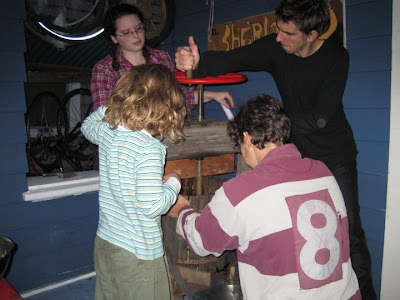
10/29/2010
Seattle 144, or Cider House

10/26/2010
Seattle 143, or poem-a-day #300
They ignore me, mostly.
Not impolitely -
they are obedient
as crocuses,
perfectly willing
to take the broom
or mop
or towel
and complete their chores
without my asking,
or to say "good!"
and flash me a thumbs-up
when I serve them food.
We color together;
today we carved a pumpkin.
They cracked roasted seeds
between their teeth, suckled
the salt.
Their conversations
bounce across the rooms,
missing me each time.
My workday
is not quite loneliness
or boredom,
but draws a card from each.
Sandra comes out of her room
with a plastic bag in her hand,
offers the contents around.
When she reaches me,
I look into her palms,
take a piece of dried fruit
covered in spices,
take a bite.
I smile, flash her a thumbs-up.
"Bueno!"
She chatters at me in Spanish
for a few seconds,
before both our faces fall
in that familiar way
of Babel.
Finally, she says
"Mannngooo"
and
"Mi Mamaaa,"
with a kind of patience.
I smile.
"Mango - tu mama."
And she smiles.
And we nod,
chewing,
this other woman's home
reaching my throat.
10/18/2010
Seattle 142, or Tastes of my new home



10/02/2010
Seattle 141, or Poem-a-day #276
was not the years of shoulderpad armor,
of being the only woman to slip
and chew her way to the board rooms
and corner offices,
but what happened after:
the night she told us
she couldn't do it anymore,
she asked our permission
to put her compass
in her pocket
and ask the stars
for directions.
When I consider
how alike we are,
I don't know how she did it -
wandered restless
for so many months,
believing she could do anything.